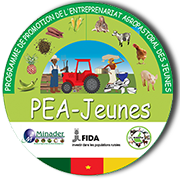- 8 mars 2021
- Envoyé par : Administrateur
- Catégorie : Actualité du programme

The covid-19 pandemic has disrupted agriculture and food systems around the world. In response to the crisis in Cameroon, the government has taken measures to minimize the negative impacts by supporting, among other things, entrepreneurial operations. In line with the said measures and in order to make young agro-pastoral entrepreneurs particularly resilient, the Youth Agropastoral Entrepreneurship Promotion Program(PEA-Jeunes), thanks to the technical and financial support of IFAD restructured itself. Like the urgency and the vulnerability of the target, flexibility and speed were at the heart of the action. An action that has adapted to the male/female issues both in content and process.
Survey : The crisis has increased the vulnerability of young girls
Ngo Tonje Emilienne, a young beneficiary engaged in restoration, testifies : « traditional media and social networks flooded us with guidelines on the dangers of being infected with COVID-19. The confinement measures and the directive on the respect of social distancing forced us to close our business ». Mekam Zangue Gwladys, owner of the Fruzam brand, was able to invest in the transformation of fruits into natural juices. Her activity experienced a real slowdown during confinement. She adds : « I usually deliver to supermarkets, restaurants and during ceremonies. During the period of confinement, i had to shutdown and, i returned to a situation of dependence »
As in the previous cases, many other young girls faced a significant decline in their business operations. While the fixed costs of their businesses remained the same, the variable costs increased due to higher prices for certain materials and inputs from outside. These profitable and booming businesses were exposed to immediate working capital problems. Indeed, they have cash flow pressures to pay salaries, rent, repayments of productive loans and bills. The investigation carried out by the program with the aim of mitigating the negative impacts of COVID-19 on the socio-economic activities of young agro pastoral entrepreneurs, revealed that the crisis severely affected their sources of income, accentuating the vulnerability of young agro-pastoral entrepreneurs.
Facing vulnerability : Effective and equitable responses
To lessen the devastating effects of the COVID-19 crisis, the PEA-Jeunes through ICTs reacted quickly by maintaining young people in the field. As gender mainstreaming is an integral part of its actions, specific mechanism have been developped for young girls and other vulnerable groups. Thanks to the support and exchange platforms created, advice was regularly provided so that they transform risks into business opportunities, maintain their operations and their workforce and hire other partners, while reconciling their entrepreneurial life with that of the home. The young girls were encouraged to put into practice the innovative technologies received during the technical training. The marketing strategies have been adapted to the crisis situation, favouring online exchanges and payments.
AndroÏd generation, the PEA-Jeunes had already anticipated the crisis by introducing them to the use of internet. More than 1000 young people, with 43% of women were supported to create their website. The network of young agropastoral entrepreneurs, led by a young girl, was called upon to enhance the value chain and strengthen solidarity actions. These initiatives, highly welcomed by stakeholders and young girls in particular, were able to create very good competition.
In addition to this advisory support actions, the program developed in line with the response action plans of the Ministry of Agriculture and Rural Development and the Ministry of Fisheries and Animal Industries, and with the support of the International Fund for Agriculture and Development two response action plans.
The first amounting to 66 millions CFA francs, had made it possible to limit the spread of the corona virus, to save the lives of more than 3,000 young agro-pastoral entrepreneurs, 43% were women. The program ensured that the information was provided in a way that reached the different girls and boys of the targeted youths.
The second plan amounting to 220 million was an addendum that became IFAD’s COVID-19 Rural Poor Stimulus Facility. It was developed on the basis of a socio economic study with gender response. Thanks to this plan, the resilience of young girls have been strengthened through production support ; the financial stabilization of their businesses and the development of market access facilities for the sale of the productions.
